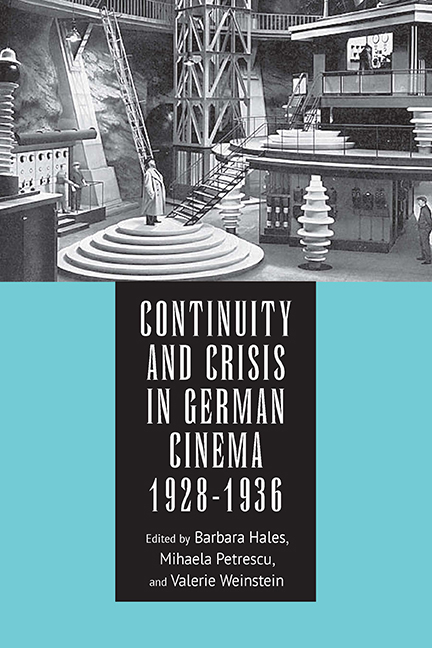Book contents
- Frontmatter
- Contents
- List of Illustrations
- Acknowledgments
- Introduction
- Part I Politics
- Part II The Economy
- Part III Concepts of Race and Ethnicity
- Part IV Genre Cinema
- Part V Making Cinema Stars
- Part VI Film Technologies
- Part VII German-International Film Relations
- Selected Bibliography
- Notes on the Contributors
- Index
11 - Objects in Motion: Hans Richter’s Vormittagsspuk (1928) and the Crisis of Avant-Garde Film
Published online by Cambridge University Press: 08 May 2021
- Frontmatter
- Contents
- List of Illustrations
- Acknowledgments
- Introduction
- Part I Politics
- Part II The Economy
- Part III Concepts of Race and Ethnicity
- Part IV Genre Cinema
- Part V Making Cinema Stars
- Part VI Film Technologies
- Part VII German-International Film Relations
- Selected Bibliography
- Notes on the Contributors
- Index
Summary
IN THE 1930S THE AVANT-GARDE ARTIST and filmmaker Hans Richter was moving about Europe in exile from Nazi Germany. After working on the Soviet-funded narrative film Metall (Metal, unfinished 1931–33) in Berlin and Moscow, Richter secured employment making industrial, advertising, and documentary films in the Netherlands and Switzerland before immigrating to the United States in 1941. Throughout this period of political crisis and exile, the German Jewish artist was persistent in applying avant-garde aesthetics to his commissioned film work, thus maintaining a degree of continuity with his more famous, experimental films of the 1920s. At the same time, he had also shifted his priorities in response to the social and political exigencies of the time. Whereas the 1920s saw Richter exploring the abstract formalism and medium-specific aesthetics of “absolute film,” by the mid-1930s he had come to privilege documentary and narrative modes of politically engaged cinema. Holding up the works of Eisenstein, Vertov, Chaplin, Flaherty, and Renoir as examples, Richter's 1939 book manuscript Der Kampf um den Film (The Struggle for the Film, revised and first published 1976) calls for cinematic works that pursue formal innovations while also revealing social and political realities to a mass audience.
Within the context of these writings, Richter presents a somewhat unfamiliar picture of the 1920s cinematic avant-garde in Europe. Referencing works like René Clair's Entr’acte (Intermission, 1924), Fernand Léger's Ballet mécanique (Mechanical Ballet, 1924), Man Ray's L’Étoile de mer (The Starfish, 1928), and his own Vormittagsspuk (released in English as Ghosts before Breakfast, 1928), Richter describes the “anarchistic” lyricism of such films as an attempt to undermine the formal conventions and sentimental, literary content of mainstream commercial films of the time. In addition to this well-known destructive side of the avantgarde, Richter also asserts a less familiar, constructive role: through the European avant-garde's rather disorderly exploitation of all cinematic possibilities, he argues, such films also functioned to awaken the audience's sensibilities to the need for an alternative form of cinema, to make this need for new formal innovations literally “fühlbar” (palpable) for the viewer.
- Type
- Chapter
- Information
- Continuity and Crisis in German Cinema, 1928-1936 , pp. 233 - 250Publisher: Boydell & BrewerPrint publication year: 2016



